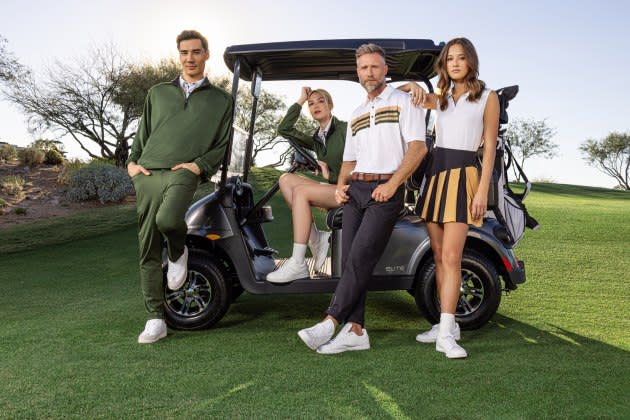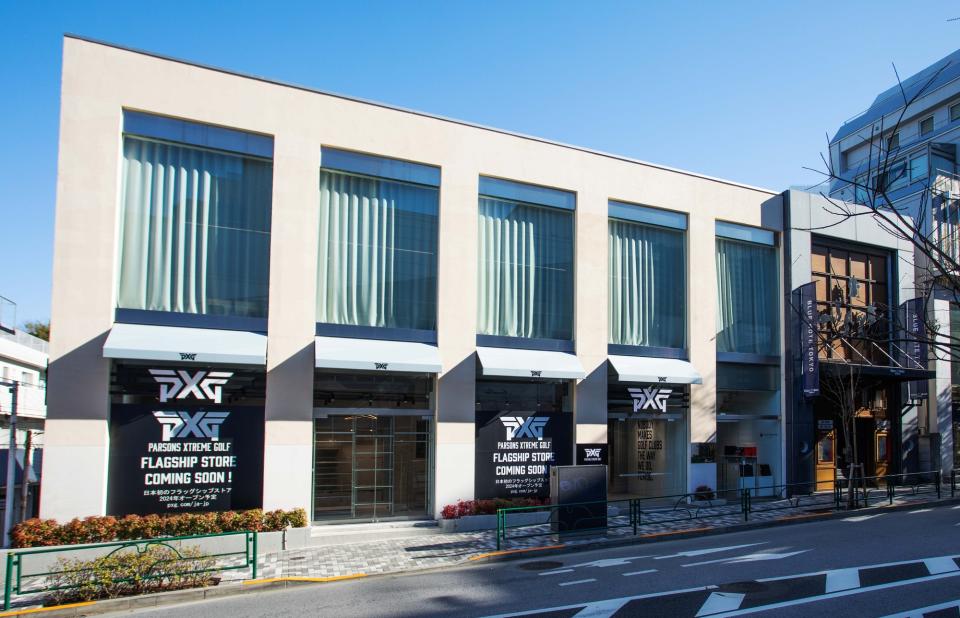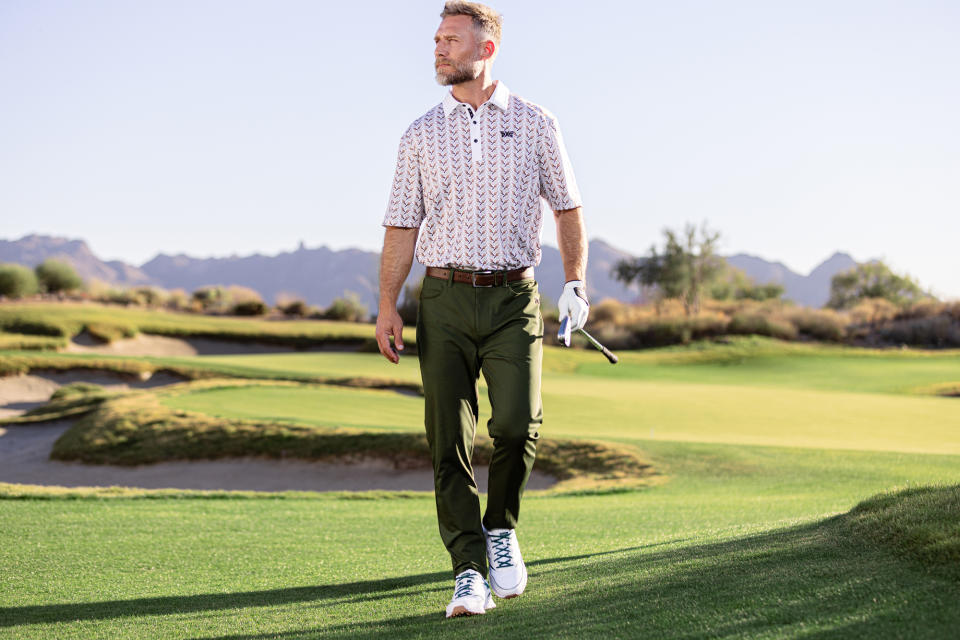PXG Targets Adding 10 Stores a Year as Golf Market Continues to Grow
- Oops!Something went wrong.Please try again later.

Over the last 11 years, PXG has slowly carved out a niche in the lucrative and competitive golf market. Now, it’s embarking on a retail rollout that will find its clubs and apparel in top golf markets around the U.S. and overseas.
The Scottsdale-based brand was founded in 2013 by billionaire entrepreneur Bob Parsons, who was frustrated by the equipment available in the golf market and set out to build a better mousetrap.
More from WWD
The Next 10 Corso Como Capsule Will Be Designed by a Central Saint Martins' Student
Municipal Taps Golf Pros Wyndham Clark and Kurt Kitayama for Collection Ahead of Masters
By that point, Parsons had already amassed a personal fortune. The Vietnam veteran, who served in the Marine Corps during the war, sold his first business, the Parsons Technology software firm, to Intuit in 1994 for $64 million, and then created GoDaddy, the world’s largest domain name registrar. In 2011, he sold his majority stake in that company in a deal valued at $2.3 billion.
So Parsons, a self-professed golf nut, had the means to double down on his new venture, Parsons Xtreme Golf. “What if we started a company that was under no time constraints, no financial constraints” and built a brand whose clubs were “better than other alternatives,” Parsons says on a video on the PXG site.
At the time, the golf industry was struggling, but Parsons was undeterred and plunged ahead. And he’s now reaping the benefit of a market that is booming thanks to the pandemic — it was one of the only sports available to play during the health crisis — and an influx of younger people to the sport. According to the Sports & Fitness Industry Association, a record 45 million Americans played golf in 2023, a 9.6 percent increase from the prior year. In 2019, that number was 34.2 million.
Five years after launching the equipment, PXG branched out into apparel as well with Renee Parsons, Bob Parsons’ wife, spearheading the category as president and executive creative director of PXG Apparel. Renee Parsons also oversees the company’s retail stores.
Currently there are 24 PXG stores in the U.S., as well as one in London and another in Tokyo. The plan, she said, is to open 10 stores a year going forward in locations where golf is most popular.
The most recent stores opened in East Bay, Calif., in mid-February, followed by Aoyama in Tokyo on March 15. Both marked new markets for the company. And Monday, a unit will open in Huntington Beach, Calif.
All of the stores sell both the equipment and the apparel and offer several golf-related bells and whistles. The Tokyo store, for example, features two custom-fitting bays with guest seating and state-of-the-art golf simulators that use TrackMan technology. It also has a dedicated putter fitting studio and practice putting green. The store also sells apparel, accessories, golf balls and golf bags.

Renee Parsons said prior to the pandemic, PXG had operated only a handful of stores, at its headquarters at the Scottsdale National golf club as well as Minneapolis, Atlanta and a suburb of Chicago.
“We wanted to open more imminently but then the pandemic hit,” she said. “But as 2020 wore on and golf boomed, we said we have to open our own stores again.”
So she and her business development manager put together a five-year retail expansion plan targeting locations with strong golf-per-capita numbers that she presented to her husband. His response: “How fast can you open?” she said with a laugh.
So between the summer of 2021 and today, PXG has added 20 stores.
“The last frontier for us was California,” she said. With two now open, a third unit in the state will open in San Diego by June.
Going forward, her plan is to continue to open stores in other communities, with Florida tops on her wish list. “We’ve been in Orlando for close to a year but we really want to open on the coast: Palm Beach and Boca are on my hit list.”
When selecting locations, she said the first criteria is that it has to be a golf-friendly community and be close to high-traffic retailers such as supermarkets or Starbucks. Malls don’t really work because customers are often carrying their clubs to use in the store or get a fitting.
“It’s really location and traffic patterns,” she said. “And parking, that’s a big one.”
Outside the U.S., PXG has a “huge presence in Korea,” where it works with Kane Co. as its local partner. There are currently TK stores in that country and “they’ve really developed the brand on the apparel side as well,” Renee Parsons said.
Korea is the third-largest golf market outside of the U.S. and Japan, and golf is considered an elite sport there because it’s a small country and there’s not a lot of land on which to build courses, she said. “It’s about status and luxury.”
Kane Co. designs its own collection of PXG apparel, and it’s more fashion-forward than the U.S. offering.

In the stores as a whole, equipment still represents a higher percentage of sales, but the apparel is growing in importance. “It’s doing quite well at retail and performing at or slightly above our forecasts,” she said.
The spring collection just hit and it offers five capsules of 52 performance and lifestyle pieces for men and women. Each offers a mix of PXG’s trademark black, white and gray palette complemented by exclusive patterns and prints in brighter hues.
Menswear still represents a higher percentage of sales but women’s is growing. Renee Parsons said that when apparel launched in 2018, men’s was 90 percent of sales. Today’s it’s 60 percent.
For the guys, she said the traditional golf polo remains the bestselling style while women are more likely to purchase a coordinated outfit. For both genders, the goal is to create pieces with performance features and materials in designs appropriate both on and off the course.
Right now, both the apparel and the equipment is only sold at PXG stores and online. But Renee Parsons said the company has done trunk shows at some golf clubs and there’s a thought to begin wholesaling.
“It’s a possibility, but it would result in a wholesale change in how we do business,” she said. “So we’re looking at it and we’re baby-stepping, not sprinting.”
Best of WWD

